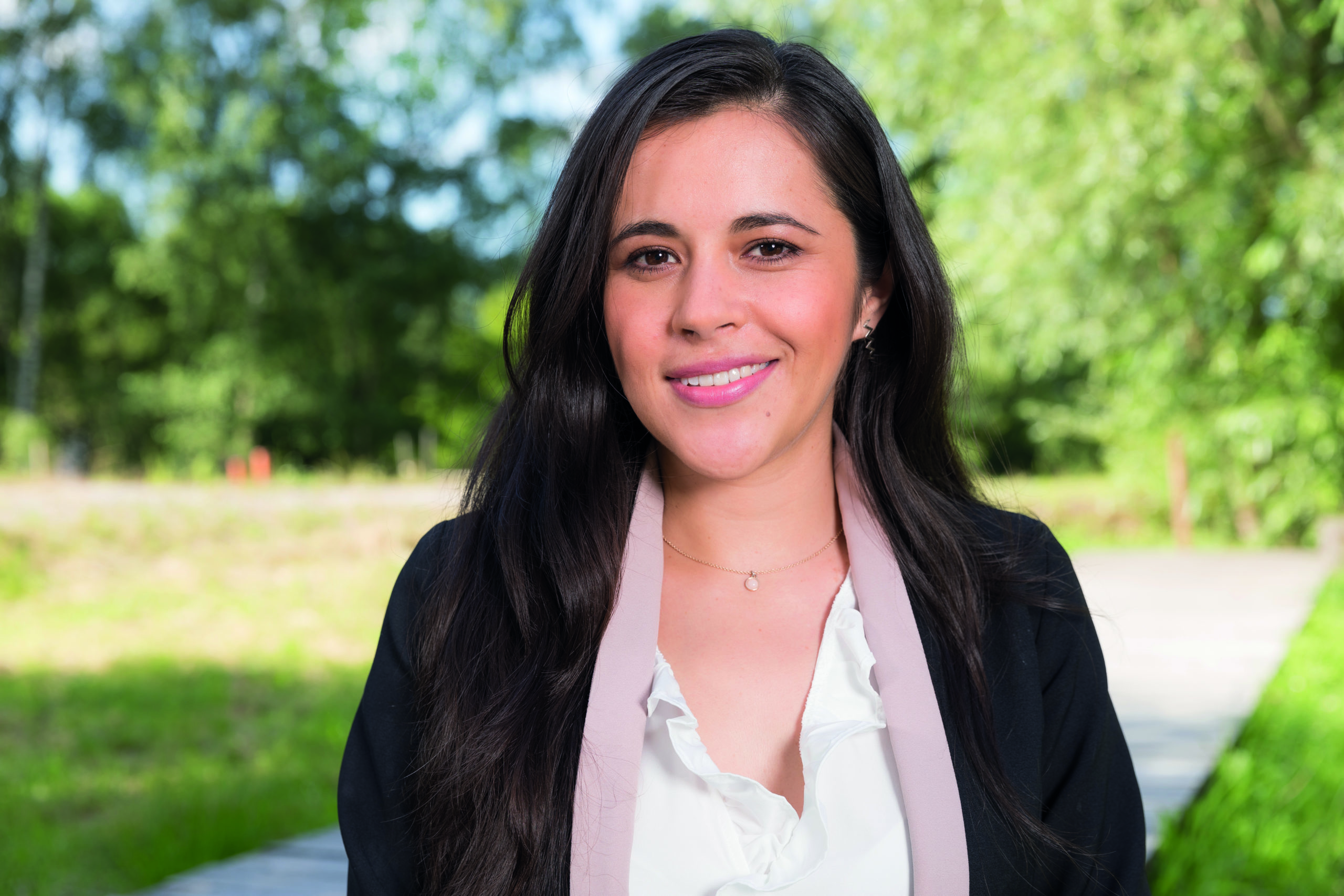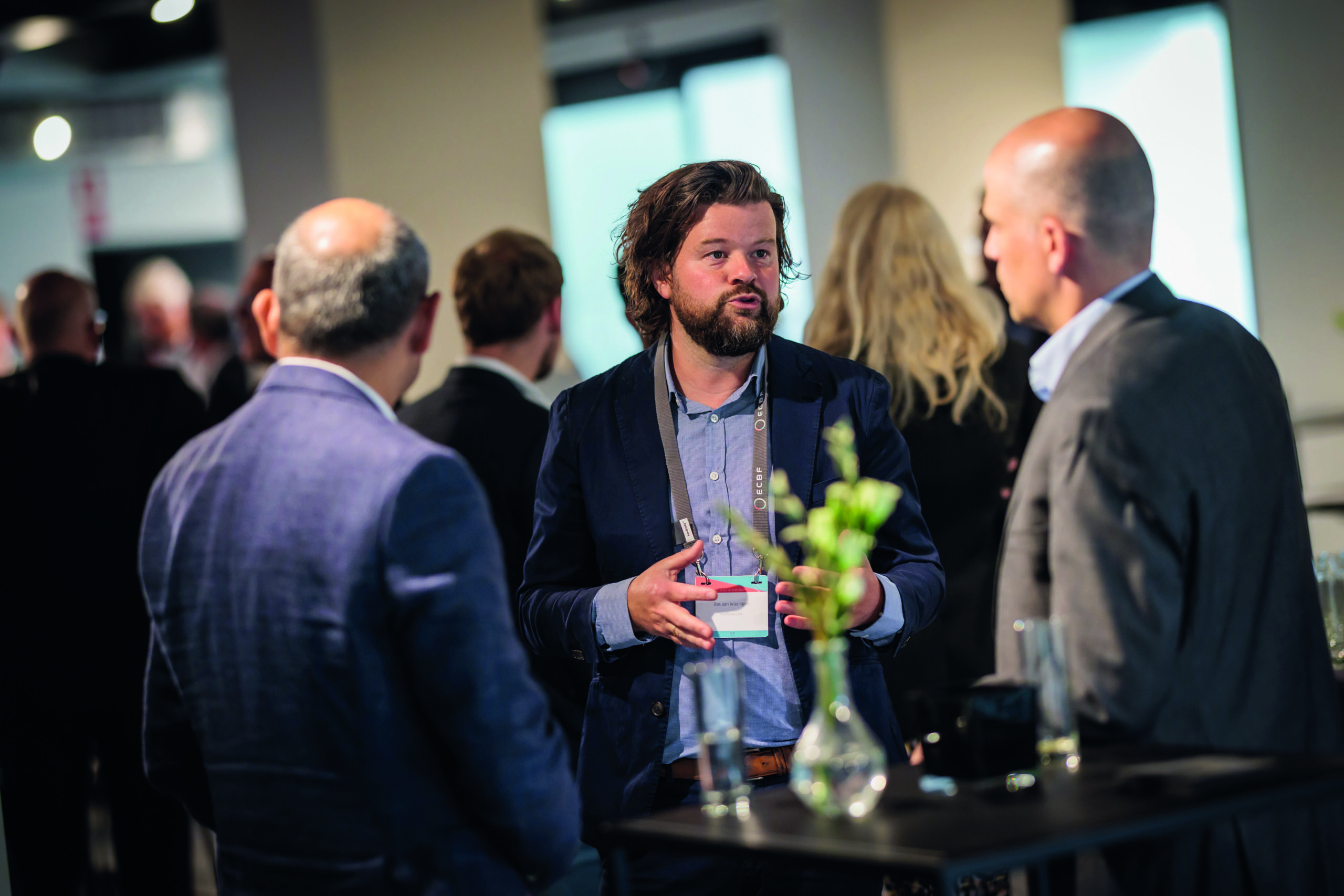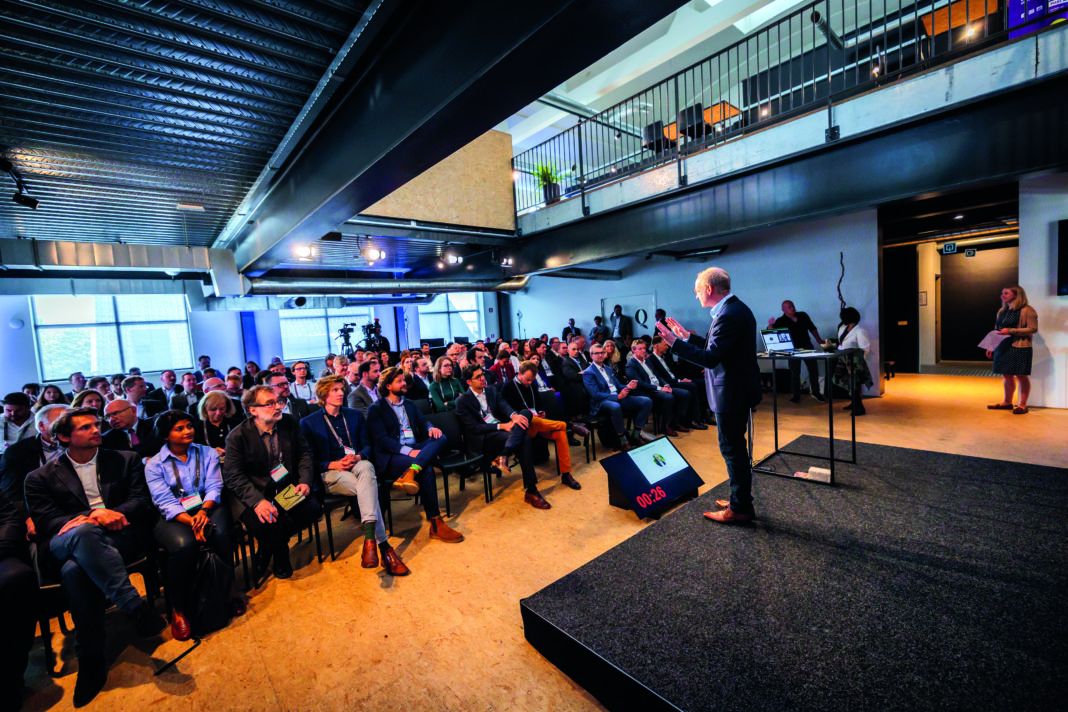Bildnachweis: Michael Brandkamp, Managing Partner, ECBF Management GmbH, Opening ECBForum 2022, BrusselsECBF Management GmbH 2022.
The European Circular Bioeconomy Fund (ECBF) aims to accelerate the transition to a sustainable future. To this end, it invests in bio-based and circular growth companies with high innovation potential, favourable returns and sustainable impact. We asked Clara Martinez, ECBF Relationship Manager, how the fund identifies and develops the “rare stars” among a large number of start-ups that are potentially worthwhile for further joint development.
Plattform Life Sciences: Mrs Martinez, how does “a common journey” with the ECBF usually begin?
Martinez: We usually get in contact with start-ups in two ways: on the one hand, there is an “inbound deal flow” – that is, the ECBF approaches start-up founders based on smart scouting in sectors of interest, or founders contact ECBF directly via email with a teaser/pitch deck. On the other hand, there is an “outbound deal flow”, where ECBF learns about start-ups through its robust network of industry partners and by actively participating in matchmaking platforms, demo days, events or start-up competitions.
Plattform Life Sciences: How does the ECBF then select the start-ups that are of interest to it?

Martinez: The fund invests 100 percent of its capital commitments in scale-up companies active in the bioeconomy, including bio-based industries, the blue economy and the circular bioeconomy. Such scale-ups must be located or active in one of the 27 EU Member States or the 16 countries associated with Horizon 2020 and have a clear unique selling proposition.
Potential investment companies must be based on novel technologies, products, processes and/or business models that can open up new markets or significantly disrupt the market. These scale-ups should enable the conversion of renewable biological resources and their waste streams into value-added products such as food, feed, bio-based chemicals, bio-based materials and high-performance biological products. In addition, they must intend to increase resource efficiencies, reduce the environmental footprint, or have a sustainable contribution (e.g. to biodiversity, keeping resources in the cycle longer, reducing toxic substances, etc.).
Plattform Life Sciences: What do you mean by the term “scale-up companies”?
Martinez: We focus on mature companies in the growth phase that have both a high technological readiness level (TRL ≥6) and business maturity. With a technology at least demonstrated in a relevant environment and a scalable business model in place, by “scale-ups” we refer to companies seeking growth and market expansion.
When considering an investment target, indicators of business maturity could include: turnover of >1 million euros or legally-binding purchase agreements with the prospect of 300–500 percent returns in 5 years as well as corresponding growth potential. Early-stage companies (TRL3-5) are monitored as far as they have a proof of concept, initial traction (e.g. pilots, LOIs, partnerships), or have an interesting technology with the potential to mature over time.
Plattform Life Sciences: If all these basic criteria are met, how is a concrete decision made as to whether an investment is made?
Martinez: We follow a multi-stage process for evaluating potential investments. After an initial screening to see whether there is any suitability at all, there is a further, more in-depth screening and finally a confirmatory due diligence. In addition to the elements I have just mentioned, we want to know above all whether the team of a company is really passionate about its vision and also has the corresponding expertise to make it come true. We also take a hard look at the company’s commercial capabilities and whether the team has a demonstrable understanding of its competitive landscape and its position in it. It needs to have a strong understanding of its existing and potential customers and be able to generate revenue from them. The robustness of the projected financials, but most importantly, their growth potential is key. A company’s ESG compliance and opportunities for differentiation are relevant due to potential effects on long-term operation and financial performance. Finally, and at the same time first and foremost, it is also a question of whether they have a convincing story that is sustainable in the long term.

Plattform Life Sciences: Fulfilling all these requirements of the ECBF will certainly not be possible for many companies… so there are very few “stars” left, aren’t there?
Martinez: Yes, that’s true in terms of quantity. There are much more early innovations still searching for product-market fit through experimentation than scale-ups. But we try to attract scalable “stars” with an effective communication strategy and strategic relationship management so that they draw attention to ECBF and its financial instruments. We actively focus on the exposure of ECBF in the relevant ecosystems where these “stars” may be hidden so we can discover them (or they to us) making use of introductions or personal connections (e.g. through network partners of ECBF). In business, the power of networking and referrals cannot be underestimated.
Besides, we communicate our interest in companies willing to build an intensive and trusting relationship with us. While we value transparency in the investor pitch and the open recognition of challenges and viable solutions, ECBF is committed to supporting companies not only through the capital injection, but also with knowledge and expertise as a member of the company’s supervisory board.
Plattform Life Sciences: But isn’t that another excluding procedure if an investor interferes so much in the company’s business?
Martinez: Yes, of course. Professional investors like us do not usually interfere with operational work or management team, but those who chose ECBF as financial partner will certainly benefit greatly from our way of interacting: ECBF monitors performance, supports, advice and connect. By becoming trustworthy long-term partners of the company, we can better understand their needs and connect them to our networks partners (industry players, service providers, and supporting entities) that may contribute with expansion and scale up of sales. They can also benefit more from our team’s industry knowledge and ECBF relationships with private and public investors. This close relationship also helps them understand investor expectations and prepare them for future funding rounds.
Plattform Life Sciences: How does the ECBF bring private and public investors on board?
Martinez: As a matter of principle, the ECBF shares its industry expertise with other investors. In this way, we try to sensitise them to the topic of the bioeconomy and interest them in increasing their financial participation in bio-based innovations.
We primarily cultivate connections with growth-VCs, banks, and corporate investors to pool the necessary financial and organizational resources that make it possible to establish technologies and bio-products of the companies successfully on the market. Such investors together with public investors are also of relevance in order to gradually build bridges for follow-on investments on our portfolio companies.
Besides, the scale-ups in our portfolio benefit from our active networking activities in the financial ecosystem which keep us and them abreast of the latest trends in venture capital, industry standards and – most importantly – best ESG investment practices. The latter is particularly appealing to public investors who have a fiduciary duty linked to promote sustainable development in a specific jurisdiction.
These networking activities, but also the ones with other stakeholders as industry experts, R&D centers, clusters, and other dedicated organizations, are particularly appreciated by growth companies. In this way, they see us – perhaps more than others – as trusted allies in their growth strategy. They immediately recognise the added value that our collaboration has for their business, given the market knowledge, technological understanding, and contacts of such ecosystem agents.
Plattform Life Sciences: Can you give us some examples of networks beyond investor relations in which the ECBF is active?
Martinez: At the pan-european level, we engage with some organisations focused on the financial industry, such as The Principles for Responsible Investment (PRI), Invest Europe, and the Investor’s Club of TechTours, but also in the bioeconomy as such, like the Circular Bioeconomy Alliance (CBA) or The Circular Bio-based Europe Joint Undertaking (CBE JU). Other actors driving investment in innovation are agencies such Business Sweden, Business Finland, Invest Denmark, ICEX-Invest in Spain and the platform BioeconomyVentures. Above all, we are very close to clusters, associations, and accelerators in our scaleup-investor activities. Their role as hubs of the local ecosystem should not be underestimated. Some examples of regional clusters and associations are the Cluster Industrielle Biotechnologie (CLIB); Navarra Industry Association; Swiss Biotech Association; The Circular Bioeconomy Cluster South-West Ireland; Bioeconomy For Change (B4C); SPRING – Italian Bioeconomy Cluster, among others. All of the above, are of strategic importance for the visibility of the ECBF in the national/local environment and among our target audience.
Plattform Life Sciences: What final remark would you give to founders considering you as an investor?
Martinez: We believe in a prosperous economy realigned with nature. For us, scale-ups active in the bioeconomy not only play a role in terms of sustainability but also in boosting economic growth. However, the success of market penetration and the financing of scaling up production depends on the ability of scale-ups to find investors they really like! Investors that resonate with their goals and not only bring money, but also expertise and networks that contributes their ambitions and further development. At ECBF, we are open to meet start-ups and scale-ups ready to start their growth journey.
Mrs Martinez, thank you very much for this interview.
The interview was conducted by Urs Moesenfechtel.
Autor/Autorin
Urs Moesenfechtel, M.A., ist seit 2021 Redaktionsleiter der GoingPublic Media AG - Plattform Life Sciences und für die Themenfelder Biotechnologie und Bioökonomie zuständig. Zuvor war er u.a. als Wissenschaftsredakteur für mehrere Forschungseinrichtungen tätig.



